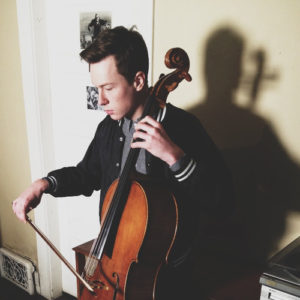Sam Anderson of Hey Marseilles: Using Music Technology to Build Community
Throughout the 20th Century, if you were a musician, chances are you had stars in your eyes. You wanted the big rock stage, the loud guitar solos, the people screeching and cheering from the audience. You wanted this as you traveled city to city, venue to venue, locale to locale. And, of course, these aims also bled into career beginnings during the 21st Century – though now, perhaps more than ever, artists’ ambitions are shifting. Just ask Seattle’s Sam Anderson.
Anderson, a skilled and proficient cello and bass player who perhaps most notably played in the well-recognized Emerald City group Hey Marseilles, has recently undertaken a shift from the arduous and busy life of a touring musician. “I’m taking a break from live performance,” Anderson explains. “This stems from my wanting to take a break from touring. I was touring too much. When I was 19, that was my job, my life. Now I’m trying to switch.”
The switch, for Anderson, pivots to more work with studio arts – but that doesn’t necessarily mean recording music, per se. Anderson has recently undertaken a crowd-funded project to record 30 young south end Seattle poets in his studio in Hillman City. “I want to use my experience with music to build community,” says Anderson. “Music is so important to me, but I needed to step away from all of the stuff in the music industry that’s not about music, which is most of it.”
So when friends who work with local organization Voices of Tomorrow, approached him about a poetry-centric recording project, Anderson jumped at the opportunity to help. The organization, located in King County, aims to provide “cultural responsive services” with a focus on early childhood education. “Voices of Tomorrow empower youths,” Anderson says. “They work primarily with East African communities in Seattle.”
Voices of Tomorrow offered a fee for his work to record a group of young poets, but Anderson thought he could raise the money through his network of fans and collaborators – and, in just a few short days, he met his financial goal of $1,600, and that number keeps growing as the campaign continues. “When they approached me, I was like, ‘Yeah, absolutely!’ This is the kind of work that I want to do in studio.”

Musician Sam Anderson.
Part of the disillusionment that comes from touring, recording and promotion is that, for many, it can separate musicians from what they love best: simply, creating a song. As the business of music grows around a band, the creativity and joy behind it can dwindle and wane. So redirecting ambition and work ethic inward and engaging the community around oneself is often where people turn next. Starting July 27th, Anderson and the young poets of Voices of Tomorrow will begin weekly recording sessions in the musician’s studio. Each session will begin with Anderson demonstrating the capabilities of the equipment, how sounds can be overlaid atop vocals, how rhythms can be added to bolster the work, and then it will be the kids’ turn to record their creative work.
“Poetry and hip-hop are closely related,” notes Anderson. “With the prevalence of hip-hop culture, it’s easy for kids to see that it’s valued. But for some in the Muslim community, there is an interpretation of the practice of Islam that music is not Halal. But you can create something using voices and a certain type of drum. So, in a way, we’re essentially making hip-hop music that doesn’t use traditional instruments.”
And while Anderson is appreciating all aspects of this upcoming project, he knows – and hopes – it will not be the last of its kind for his Hillman City home base. “Eventually,” he says, “I want this to feel like a community studio. I think the studio is such an important place – but now it means something different. People have studios in their bedrooms, or your phone can be your studio, but having an actual space dedicated to expression and the recording arts is powerful.”